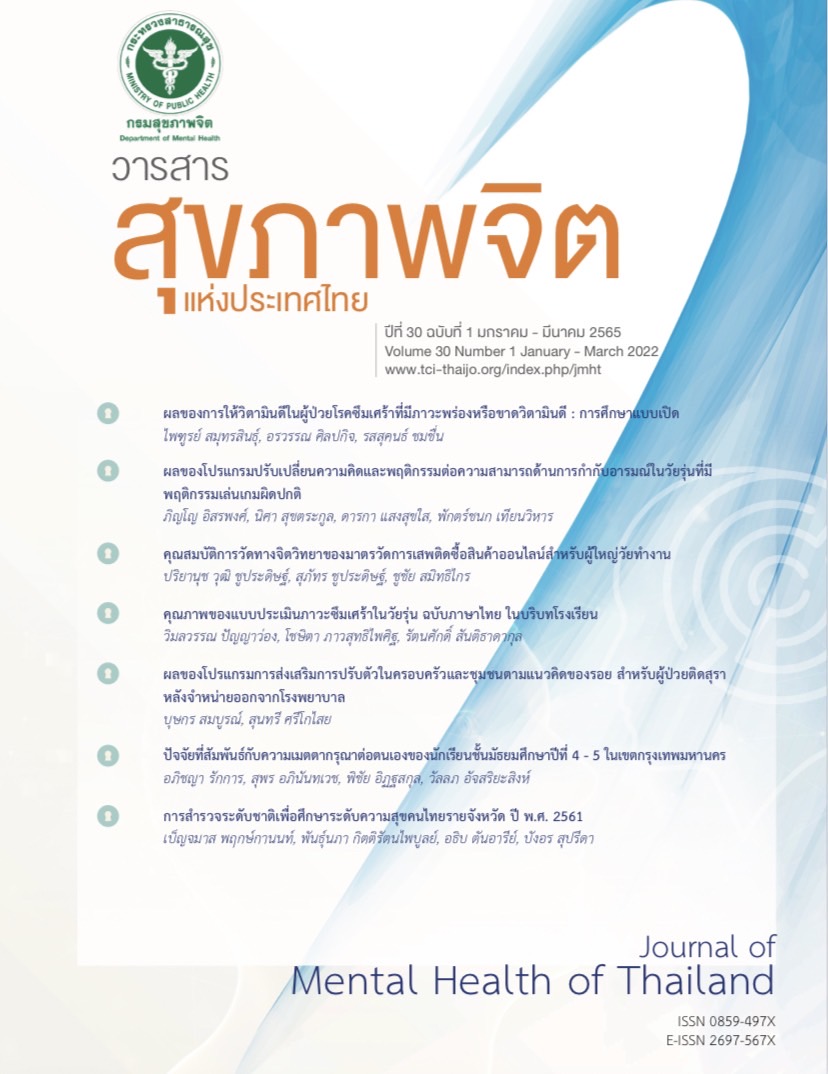ปัจจัยที่สัมพันธ์กับความเมตตากรุณาต่อตนเองของนักเรียนชั้นมัธยมศึกษาปีที่ 4 - 5 ในเขตกรุงเทพมหานคร
คำสำคัญ:
ความเมตตากรุณาต่อตนเอง, ความเครียด, วัยรุ่น, รูปแบบการเลี้ยงดูบทคัดย่อ
วัตถุประสงค์ : เพื่อศึกษาความสัมพันธ์ระหว่างความเมตตากรุณาต่อตนเองกับความเครียด และปัจจัยที่เกี่ยวข้องกับความเมตตากรุณาต่อตนเองของนักเรียนชั้นมัธยมศึกษา
วิธีการ : เป็นงานวิจัยเชิงวิเคราะห์แบบภาคตัดขวาง กลุ่มตัวอย่าง คือ นักเรียนชั้นมัธยมศึกษาปีที่ 4 - 5 ในโรงเรียนสังกัดสำนักงานคณะกรรมการการศึกษาขั้นพื้นฐานและสำนักงานคณะกรรมการส่งเสริมการศึกษาเอกชน จำนวน 496 คน เครื่องมือที่ใช้ในงานวิจัย ได้แก่ แบบวัดความเครียดสำหรับคนไทย แบบวัดความเมตตากรุณาต่อตนเอง และแบบสอบถามรูปแบบการเลี้ยงดูของบิดามารดา วิเคราะห์ข้อมูลด้วยสถิติร้อยละ ค่าเฉลี่ย ส่วนเบี่ยงเบนมาตรฐาน Kruskal-Wallis test, Pearson’s chi-square, Fisher’s exact test, multinomial logistic regression และ Spearman’s rank correlation
ผล : ความเครียดมีความสัมพันธ์ทางลบกับความเมตตากรุณาต่อตนเองอย่างมีนัยสำคัญทางสถิติ (r = -.404) ปัจจัยที่มีความสัมพันธ์ กับความเมตตากรุณาต่อตนเอง ได้แก่ ผลการเรียน และรูปแบบการเลี้ยงดู โดยการเลี้ยงดูแบบให้อิสระอย่างมีขอบเขตและแบบยอมตามมีความสัมพันธ์กับการมีความเมตตากรุณาต่อตนเองสูง
สรุป : ความเครียดมีความสัมพันธ์แบบผกผันกับความเมตตากรุณาต่อตนเอง ผลการเรียนและรูปแบบการเลี้ยงดูมีความสัมพันธ์ต่อความเมตตากรุณาต่อตนเองของนักเรียนชั้นมัธยมศึกษา
Downloads
เอกสารอ้างอิง
รสวันต์ อารีมิตร, สุภิญญา อินอิว, บุญยิ่ง มานะบริบูรณ์, ศิริไชย หงษ์สงวนศรี, สมจิตร์ จารุรัตนศิริกุล, บรรณาธิการ. ตำราเวชศาสตร์วัยรุ่น. นนทบุรี: ห้างหุ้นส่วนจำกัดภาพพิมพ์; 2559. น. 117-28.
Özdemir A, Utkualp N, Palloş A. Physical and psychosocial effects of the changes in adolescence period. International Journal of Caring Sciences. 2016;9(2):717-23.
นิธิสนี รุจิรังสีเจริญ, นิดา ลิ้มสุวรรณ, ศิริไชย หงษ์สงวนศรี, บัญญัติ ยงย่วน. ปัจจัยที่สัมพันธ์กับระดับความเครียดของนักเรียนระดับมัธยมศึกษา สังกัดกรุงเทพมหานคร [Factors associated with stress levels in secondary school students under Bangkok metropolitan administration]. วารสารสมาคมจิตแพทย์แห่งประเทศไทย. 2564;66(1):53-68.
ฐิตวี แก้วพรสวรรค์, เบญจพร ตันตสูติ. การศึกษาความชุกของภาวะซึมเศร้าและปัจจัยที่เกี่ยวข้องในเด็กนักเรียนชั้นมัธยมศึกษาปีที่ 5 ในกรุงเทพมหานคร [The prevalence of depression in 2nd year high school students in Bangkok]. วารสารสมาคมจิตแพทย์แห่งประเทศไทย. 2555;57(4):395-402.
Nichter M, Nichter M, Carkoglu A. Reconsidering stress and smoking: a qualitative study among college students. Tob Control. 2007;16(3):211-4. doi:10.1136/tc.2007.019869.
Sinha, R. How does stress increase risk of drug abuse and relapse?. Psychopharmacology (Berl). 2001;158(4):343-59. doi:10.1007/s002130100917.
Panyayong B. Suicide among children and adolescents in Thailand. Journal of the Psychiatric Association of Thailand. 2006;51(1):11-20.
Bluth K, Gaylord SA, Campo RA, Mullarkey MC, Hobbs L. Making friends with yourself: a mixed methods pilot study of a mindful self-compassion program for adolescents. Mindfulness (N Y). 2016;7(2):479-92. doi:10.1007/s12671-015-0476-6.
Krieger T, Hermann H, Zimmermann J, Holtforth MR. Associations of self-compassion and global self-esteem with positive and negative affect and stress reactivity in daily life: findings from a smart phone study. Personality and individual differences. 2015;87(1)288-92. doi:10.1016/j.paid.2015.08.009.
Zessin U, Dickhäuser O, Garbade S. The relationship between self-compassion and well-being: a meta-analysis. Appl Psychol Health Well Being. 2015;7(3):340-64. doi:10.1111/aphw.12051.
Yang Y, Zhang M, Kou Y. Self-compassion and life satisfaction: the mediating role of hope. Pers Individ Dif. 2016;98:91-5. doi:10.1016/j.paid.2016.03.086.
Sun X, Chan DW, Chan L-k. Self-compassion and psychological well-being among adolescents in Hong Kong: exploring gender differences. Pers Individ Dif. 2016;101:288-92. doi:10.1016/j.paid.2016.06.011.
Neff KD, Rude SS, Kirkpatrick KL. An examination of self-compassion in relation to positive psychological functioning and personality traits. J Res Pers. 2007;41(4):908-16. doi:10.1016/j.jrp.2006.08.002.
Bluth K, Roberson PN, Gaylord SA, Faurot KR, Grewen KM, Arzon S, et al. Does self-compassion protect adolescents from stress?. J Child Fam Stud. 2016;25(4):1098-109. doi:10.1007/s10826-015-0307-3.
Zhang Y, Luo X, Che X, Duan W. Protective effect of self-compassion to emotional response among students with chronic academic stress. Front Psychol. 2016;7:1802. doi:10.3389/fpsyg.2016.01802.
Neff KD, Kirkpatrick KL, Rude SS. Self-compassion and adaptive psychological functioning. J Res Pers. 2007;41(1):139-54. doi:10.1016/j.jrp.2006.03.004.
Bluth K, Campo RA, Futch WS, Gaylord SA. Age and gender differences in the associations of self-compassion and emotional well-being in a large adolescent sample. J Youth Adolesc. 2017;46(4):840-53. doi:10.1007/s10964-016-0567-2.
Pepping CA, Davis PJ, O'Donovan A, Pal J. Individual differences in self-compassion: the role of attachment and experiences of parenting in childhood. Self and Identity. 2015;14(1):104-17. doi:10.1080/15298868.2014.955050.
โครงการพัฒนาเครือข่ายการจัดการเชิงพื้นที่ในการวิเคราะห์สภาวการณ์และขับเคลื่อนการพัฒนาคุณภาพชีวิตเด็กและเยาวชน. Child Watch กับสภาวการณ์เด็กและเยาวชนในรอบปี 2554-2555 [Child watch and the situation of children and youth in the year 2011-2012] [อินเทอร์เน็ต]. กรุงเทพฯ: สถาบันรามจิตติ; 2557 [สืบค้นเมื่อวันที่ 3 พ.ค. 2560]. จาก: https://www.teenpath.net/content.asp?ID=17832#.YgH41-rP2Ht
สำนักนโยบายและแผนการศึกษาขั้นพื้นฐาน กระทรวงศึกษาธิการ. ข้อมูลรายชื่อโรงเรียนสังกัด สพฐ. ปี 2559 [Information on the list of schools under OBEC in 2016] [อินเทอร์เน็ต]. กรุงเทพฯ: สำนัก; 2560 [สืบค้นเมื่อวันที่ 3 พ.ค. 2560]. จาก: http://www.bopp-obec.info/home/?page_id=22308
สำนักงานคณะกรรมการส่งเสริมการศึกษาเอกชน กระทรวงศึกษาธิการ. สถิติการศึกษาเอกชน ปีการศึกษา 2558 [Statistics of private education, academic year 2015] [อินเทอร์เน็ต]. กรุงเทพฯ: สำนักงาน; 2560 [สืบค้นเมื่อวันที่ 3 พ.ค. 2560]. จาก: https://opec.go.th/ข้อมูลสารสนเทศ-2/.
ศลักษณา กิติทัศน์เศรณี, สุปาณี สนธิรัตน, ทิพย์วัลย์ สุรินยา. ความสัมพันธ์ระหว่างรูปแบบการเลี้ยงดูของบิดามารดากับภาวะซึมเศร้าของนักเรียนระดับช่วงชั้นที่ 4 [The relationship between parenting styles and depression of the fourth level students]. รามาธิบดีพยาบาลสาร. 2552;15(1):36-47.
Levin E. Baumrind’s Parenting Styles. In: Goldstein S, Naglieri JA, editors. Encyclopedia of Child Behavior and Development. Boston, MA: Springer US; 2011. p. 213-5.
วัชราวดี บุญสร้างสม. ความสัมพันธ์ระหว่างการรับรู้ความเครียดและความสุขในนิสิตนักศึกษามหาวิทยาลัยโดยมีความเมตตากรุณาต่อตนเองเป็นตัวแปรส่งผ่าน [The relationship between perceived stress and happiness of university students with self-compassion as a mediator] [วิทยานิพนธ์ปริญญามหาบัณฑิต]. กรุงเทพฯ: จุฬาลงกรณ์มหาวิทยาลัย; 2556.
Phattharayuttawat S, Ngamthipwattana T, Sukhatungkha K. The development of the Thai stress test. Journal of the Psychiatric Association of Thailand. 2000;45(3):237-50.
Biggs A, Brough P, Drummond S. Lazarus and Folkman's psychological stress and coping theory. In: Cooper CL, Quick JC, editor. The Wiley handbook of stress and health: a guide to research and practice. Chichester: John Wiley & Sons; 2017. p. 349-64.
Allen AB, Leary MR. Self-compassion, stress, and coping. Soc Personal Psychol Compass. 2010;4(2):107-18. doi:10.1111/j.1751-9004.2009.00246.x.
Lathren C, Bluth K, Park J. Adolescent self-compassion moderates the relationship between perceived stress and internalizing symptoms. Pers Individ Dif. 2019;143:36-41. doi:10.1016/j.paid.2019.02.008.
Aunola K, Nurmi JE. The role of parenting styles in children’s problem behavior. Child Dev. 2005;76(6):1144-59. doi:10.1111/j.1467-8624.2005.00841.x.
Hall JL. An examination into the relationship between self-compassion and parenting styles [Undergraduate Honors Theses]. Tennessee: East Tennessee State University; 2015.
ดาวน์โหลด
เผยแพร่แล้ว
รูปแบบการอ้างอิง
ฉบับ
ประเภทบทความ
สัญญาอนุญาต
ลิขสิทธิ์ (c) 2022 วารสารสุขภาพจิตแห่งประเทศไทย

อนุญาตภายใต้เงื่อนไข Creative Commons Attribution-NonCommercial-NoDerivatives 4.0 International License.
- ผู้อ่านสามารถนำข้อความ ข้อมูล จากวารสารไปใช้ไปใช้ประโยชน์ทางวิชาการได้ เช่น เพื่อการสอน เพื่อการอ้างอิง แต่การนำไปใช้เพื่อวัตถุประสงค์อื่น เช่น เพื่อการค้า จะต้องได้รับอนุญาตเป็นลายลักษณ์อักษรจากกรมสุขภาพจิตก่อน
- ความคิดเห็น ข้อมูล และบทสรุปต่าง ๆ ที่ลงตีพิมพ์ในวารสารสุขภาพจิตแห่งประเทศไทยเป็นของผู้เขียนบทความและมิได้แสดงว่ากองบรรณาธิการหรือกรมสุขภาพจิตเห็นพ้องด้วย




